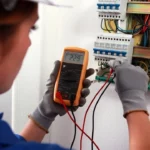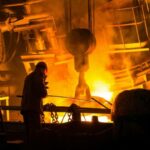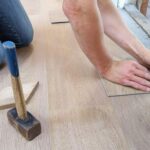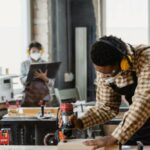Hey there! I’m Sam from Qualify Me!, Australia’s leading RPL (Recognition of Prior Learning) company. If you’ve been working in the construction industry for a while but don’t have formal qualifications, you’re probably already aware of how important a carpentry qualification can be in unlocking new opportunities.
Here at Qualify Me!, I’ve helped hundreds of people just like you turn their hard-earned skills into nationally recognised qualifications. Today, I want to talk about how getting your CPC30220 Certificate III in Carpentry can set you up for a successful career and how you can achieve this qualification quickly without going through years of training.
Why You Need a Carpentry Qualification
Let’s face it—Australia’s construction industry is booming, and qualified carpenters are in high demand. But without formal qualifications, you might be missing out on better pay, more jobs, and higher job security.
As I always say, “A formal qualification doesn’t just validate your skills—it opens doors to bigger and better projects.”
You might already have years of experience, but a nationally recognised carpentry qualification is what employers are looking for. It’s a must if you want to work on major construction sites or start your own carpentry business.
Fast-Track Your Carpentry Qualification with RPL
Here’s the good news: you don’t need to go back to TAFE or spend years in an apprenticeship to get qualified. With Recognition of Prior Learning (RPL), you can use the skills and experience you already have to fast-track your carpentry qualification.
At Qualify Me!, we’ve designed a streamlined process that’s quick and easy:
- Skills Assessment: We start with a free skills assessment to determine your eligibility.
- Portfolio of Evidence: You’ll gather proof of your experience (such as photos of your work, references, and certificates).
- Competency Check: We review your skills and ensure everything meets the standards.
- Get Qualified: Once everything’s in order, you’ll receive your nationally recognised carpentry qualification.
This process could save you years of formal training. And the best part? You’ll be ready to take on bigger roles and increase your earning potential.
"At Qualify Me!, we believe in turning your experience into qualifications fast, so you can keep moving forward in your career without slowing down."
The Skills You’ll Gain with a Carpentry Qualification
When you complete your carpentry qualification, you’ll gain a wide range of practical skills that are essential on any job site:
- Framing and formwork: You’ll learn how to construct the skeleton of buildings, which is a fundamental skill for any carpenter.
- Blueprint reading: Understanding how to read and interpret building plans is crucial for accurate construction.
- Building codes and safety regulations: You’ll be fully aware of Australia’s construction laws and ensure that every project meets safety standards.
These skills will make you stand out from the competition and give you the confidence to take on more complex projects.
Career Opportunities with a Carpentry Qualification
Once you’ve secured your CPC30220 Certificate III in Carpentry, you’ll have access to a wide range of job opportunities:
- Residential Carpenter: Work on homes, renovations, and extensions.
- Commercial Carpenter: Get involved in large-scale construction projects like office buildings, schools, or shopping centres.
- Formwork Carpenter: Specialise in creating the molds for concrete structures, an essential skill for infrastructure projects.
And if you’re thinking about starting your own carpentry business, a formal qualification is your golden ticket to get registered and insured as a contractor.
"With a carpentry qualification, you’re not just another tradie—you’re a skilled professional who’s ready to take on any job."
Frequently Asked Questions About Carpentry Qualifications
How long does it take to get a carpentry qualification through RPL?
The RPL process can be completed much faster than traditional training methods. At Qualify Me!, we typically see our clients qualify within a few months, depending on how quickly they can gather their evidence.
What is the CPC30220 Certificate III in Carpentry?
The CPC30220 Certificate III in Carpentry is the nationally recognised qualification for carpenters in Australia. It covers essential skills like framing, formwork, and blueprint reading.
Can I apply for RPL if I have informal carpentry experience?
Absolutely! Recognition of Prior Learning is designed for people who’ve gained their skills on the job, whether that’s through informal work or previous training.
Why should I get a carpentry qualification if I already have experience?
Without a formal qualification, you could be missing out on better job opportunities and higher pay. A carpentry qualification shows employers that your skills meet national standards and that you’re ready to take on more responsibility.
How does getting qualified through Qualify Me! help me locally?
As Australia’s leading RPL company, Qualify Me!, we specialise in helping local tradies fast-track their qualifications. This gives you an edge in your local job market, helping you stand out from the crowd and secure better contracts.
How to Get Started with Qualify Me!
Ready to take the next step? At Qualify Me!, we make the process as simple as possible. Whether you’ve been working as a carpenter for 2 years or 20, we can help you get your carpentry qualification fast. And if you’re looking for a local RPL company you can trust, you can always check out our Google reviews here.
"Getting your qualification shouldn’t slow you down. With Qualify Me!, it’s quick, easy, and tailored to your experience."
Conclusion
A carpentry qualification is the key to unlocking better job opportunities, higher pay, and more job security in Australia’s booming construction industry. With Qualify Me!, you can fast-track your certification and start enjoying the benefits of being a fully qualified carpenter.
Are you wondering how to receive plumbing licensing in NSW, Australia?
If you are, then you should know there's a combination of training, certifications, and apprenticeships to take to become a plumber. If you want to work with gas fittings, plumbing, and drainage, you will have to learn new skills to understand how plumbing works.
Becoming a licensed plumber in NSW is different from other states in Australia, so you must take specific courses meant for this area.
Continue reading to find out the necessary steps to take to gain plumbing licensing in NSW.
What Are the Qualifications to Receive Your Plumbing Licence in NSW
If you hope to get a plumbing license in NSW, you must first get a certificate III in Plumbing qualification. The training course also consists of specific subjects and electives that help the student to become trained in a particular trade. In addition, individuals will also get real-life experience working as an apprentice with a supervisor on the various aspects of plumbing.
What Are the Different Kinds of Plumbing Licences
Applicants for a plumbing licence in NSW can choose from a range of different specialisations. The following are examples of specialist jobs: RBL plumbing, gas fitting, and draining. Below are the main types of plumbing licenses you
Licensed Plumbing Supervisor
A person with this license can supervise and perform the plumbing work listed on the certificate. As a supervisor, you will have to determine the cost of plumbing problems, obtain materials necessary to complete the job and make stretches for plumbing layouts. With this license, individuals can only hire others to work for them, not companies.
Endorsed Licensed Contractor
Those who obtain an endorsed contractor licence have the right to hire individual plumbers. Therefore, it is necessary to meet the qualifications, experience, and skills associated with obtaining this license.
Someone with a plumbing licence working as a contractor will work with new construction and remodel old plumbing. You will also handle plumbing dealing with a water supply and septic systems. A licensed, endorsed contractor can also perform qualified supervisory work.
Tradesperson Certificate
With a tradespeople certificate, a person can perform work such as plumbing, drainage, and gas fitting. You can also install, repair, and maintain water and sewer lines as a plumber with a tradesperson certificate. In addition, installing pipes for sprinkler systems or assembling ductwork and plumbing parts may be a part of the job.
However, they cannot sign off on work without supervision. Therefore, someone with a supervisor's or contractor's licence will be required to supervise and sign off any individual's work.
What Steps Should I Take if I Want to Specialise in a Particular Area of Plumbing
If there's a specific area of plumbing you would like to specialise in, then it will require you to take certain plumbing qualifications. Below are the requirements for some plumbing license specialisation.
Plumbing, Gas Fitting, and Drainage
As a licensed plumber who is certified to work in these three areas, you will work with the water plumbing supply system, sewage, wastewater management, and sanitary plumbing. You will need a plumbing certificate III or work under a supervisor plumber during an apprenticeship to specialise.
Water Plumbing
A licensed plumber who specialises in water plumbing works with water supply systems. They also work with pipes and fittings connecting to water mains and sewage or wastewater systems. You will need a plumbing certificate III or gain experience from an apprenticeship to specialise in water plumbing.
Water Plumbing for Fire Protection Systems
Someone who has a plumbing license and specialises in fire protection systems may also work within the fire service. Often people who work within the fire service work with the plumbing and drainage systems.
For example, you will need to know how to work with the fire sprinkler system and be able to connect to the water mains. For you to specialise within this area, you will need a certificate III in fire protection or gain experience in an apprenticeship.
Water Plumbing in Urban Irrigation
Someone with plumbing licensing in NSW will work on the irrigation systems within the urban environments. You will install water lines to homes and businesses, inspect water systems, and fix plumbing issues. To specialise in this area, you will need to receive a certificate ll in urban irrigation.
You can also take the route of specialising within the areas of drainage and gas fitting work. For example, someone with licensing plumbing who specialises in drainage will remove and clean the wastewater from a house or business.
A licensed plumber who specialises in gas fitting will install, extend, and repair gas systems. If you would like to specialise in drainage work or gas fitting work, you will need to receive a certificate III take the suitable courses for it, and gain experience through an apprenticeship.
How Do I Apply for the Plumbing Licensing in NSW
After you undertake your required plumbing qualifications, such as CPC40920 - Certificate IV in Plumbing and Services, you may obtain your plumbing licence by completing an application and paying their fees to Service NSW. Below are the details and forms necessary for those who wish to obtain a plumbing licence in NSW:
- The application form and checklist
- Current and previous plumbing licenses details
- Originals of any certifications and qualifications, for example, any apprenticeships you have completed
- Work experience and employment details
- Details of criminal offences or insolvency
- Proof of identity or passport picture
You should also keep in mind the fees and payment when trying to receive a plumbing licence. The amount you pay depends on how long you would want to be a licence for.
Receiving a plumbing licence is the best thing you can do to turn yourself from an employee into a business person. Read more here if you would like to read how tradesman coach Dale has helped someone else turn into a skilled business person.
What About Migrant Plumbers and RPL in Plumbing
If you're migrating to Australia wishing to gain a plumbing license, you will need to receive a Plumber skills assessment and Offshore Technical Skills Record (OTSR). You will need the plumbing skills assessment for your visa application and the OTSR to obtain your provisional license.
Keep in mind you can only work under supervision with a provisional licence. You must find a Plumber employer after receiving your provisional license so you can work for them as a Plumber for 12 months. After this step, you can start on your Plumber GAP Training program.
Also, there are different requirements for each state and territory in Australia to take to receive your plumbing license. Therefore, you should contact the NSW Office of Fair Trading to apply for your Plumber provisional license.
The next step is to gain your RPL in plumbing, which we at Qualify Me can help you with. You don't know what an RPL is? It stands for Recognition of Prior Learning, and our course enables you to turn your prior skills in plumbing into becoming nationally accredited by Australia.
It is excellent for those from another country who want to utilise their plumbing skills within the NSW area. We take the time to look at your prior experiences and qualifications to help prevent you from having to retake training you may have already received.
After you receive your RPL in plumbing, you will be able to apply for your NSW plumbing license. Of course, we have a blog post on how an RPL can elevate your career. Come read out how here.
How Much Can I Make With My Plumbing Licensing in NSW
We know you are wondering how much you can make as a plumber within the NSW area. According to Indeed, someone with a plumbing licensing can make $42 an hour at least. This figure increases sharply if you are a sole trader who sub contracts or own your own plumbing business.
As you can see, earning a skilled trade can be a better investment than attending college to earn a degree. However, when you attend college, you will have to spend four years or more to receive a degree. Also, you will rank in a large amount of college debt that you will have to spend most of your life paying back.
When you receive a trade skill, you spend less amount of money and time than on a college degree. So, if you prefer not to attend college and would still like to work in a profession that requires skill, then consider a trade. Just think about how much you can make with an RPL in plumbing!
Now You Know How to Receive Your Plumbing Licensing in NSW
Since you know how to gain your plumbing licensing in NSW, there's only one thing to do now. It's time to get the ball rolling and take the necessary steps to become a licensed plumber in Australia.
If you need help with your plumbing licensing in Victoria, then contact Qualify Me today!














The guide addresses the importance of shell condition when evaluating the cost and readiness of a space. Additionally, the article outlines the process for migrant plumbers and the role of Recognition of Prior Learning (RPL) in obtaining a license. The inclusion of potential earnings and the comparison to traditional college degrees adds valuable context to the career path. Overall, this guide provides essential insights for individuals considering a career in plumbing and seeking to thrive in the industry.
Hi Burnice,
Please call 1800 765 295 or simply fill in the form on the contact us page and we will be in touch
Thank you for the blog
This blog is not only valuable for plumbing professionals but also for property owners and managers who want to make informed decisions regarding their plumbing systems. It underscores the importance of hiring experienced professionals who understand these differences, ensuring that plumbing systems function optimally in both residential and commercial spaces.
Hi Adrieanne,
Please call 1800 765 295 or simply fill in the form on the contact us page and we will be in touch